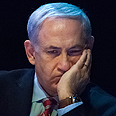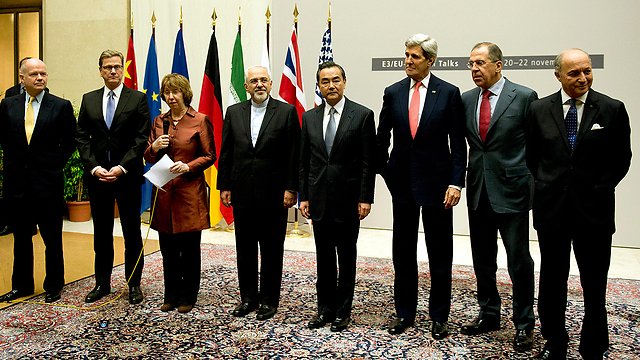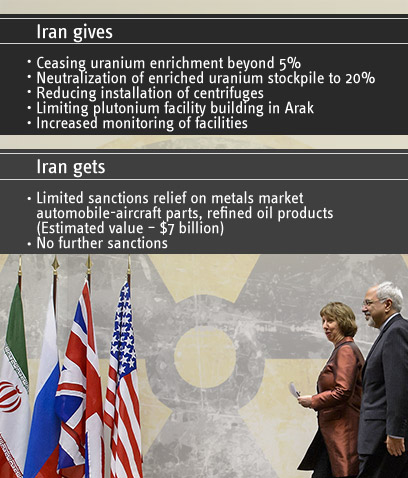
Obama to Netanyahu: US will remain committed to Israel
PM, US president discuss Iran nuclear deal, White House reports. Though Netanyahu reiterates agreement is 'dangerous,' Iran expert says deal has positive features, such as continuing oil sanctions
US President Barack Obama spoke by phone with Prime Minister Benjamin Netanyahu on Sunday to discuss a nuclear deal between Iran and six major powers that Israel opposes.
The White House announced the call as Obama flew aboard Air Force One from Washington to Seattle.
Related stories:
- Netanyahu calls Iranian deal 'historic mistake'
- Read full interim deal with Iran
- Winners and losers of nuclear deal
President Obama attempted to reassure a skeptical Netanyahu, saying he wants to begin consultations with Israel immediately.
White House spokesman Josh Earnest told reporters on Air Force One that the two leaders reaffirmed the shared goal of preventing Iran from obtaining a nuclear weapon.
"Consistent with our commitment to consult closely wth our Israeli friends, the president told the prime minister that he wants the United States and Israel to begin consultations immediately regarding our effort to negotiate a comprehensive solution," Earnest said.
"The president underscored that the United States will remain firm in our commitment to Israel which has good reason to be skeptical about Iran's intentions," he said.
Earlier Sunday, Prime Minister Netanyahu said in the EMET Prize for Art, Science and Culture ceremony that "as more and more details are being attached to the deal that was reached yesterday in Geneva, it's becoming clearer that this is a bad a deal and a dangerous one for the world, the region and Israel."
"Iran is receiving billions of dollars in relief in the sanctions without paying any sort of price. Iran is receiving written approval to violate UN Security Council resolutions," the prime minister said.
Israeli Iran expert: Nuclear deal not all bad
The agreement signed Saturday night by Iran and the world powers in Geneva was received with profound resentment in Israel, as senior officials in the government, led by Prime Minister Benjamin Netanyahu, condemned the pact. There are, however, other voices in Israel who say the deal also includes considerable achievements, such as maintaining current sanctions and preventing 20% uranium enrichment.
Former head of the Iran division in the Prime Minister's Office, Yoel Guzansky, said Israel made all of its specifications public, knowing that not all of them would be approved.
"Part of Israel's policy was to ask for the maximum with the hope and aspiration that at least half would be accepted," he said. "I'm sure that the prime minister and others didn't expect all of their demands to be fulfilled, because it's not real."
Guzansky, who nowadays serves as an analyst for the Institute for National Security Studies, expressed ambivalence toward the deal. "To call it good or bad; to make a binary division of all or nothing is a mistake," he said. "The deal is a lot more complicated – there are positive sides and negative sides. I don't agree with the statement that was made by government sources, saying this is a bad agreement and the sky is going to fall tomorrow."
According to Guzansky, he wholeheartedly sympathaizes with the cries of anger in Israel. After all, Israel found itself up against the US, and at times it looked as if there was a battle between the two allies. The deal left Netanyahu dissatisfied, and all he could do was look at the agreement and try to extract what good for Israel he could.
More than centrifuges
"The most severe problem in the agreement was that it essentially fixed firmly the status of Iran as on the threshold of nuclear powers," he said. "The deal doesn't deal with other issues such as Iran's missile arsenal or its problematic ties in the region – the support of Hamas, Hezbollah and other terrorist organizations. It's a matter of one centrifuge more or less, but I think that the issue that's not less significant is what the deal will do to the status of Iran in the region. Here the result is negative for Israel and the moderate Arab nations."
Guzansky said that it's necessary to look at Iran's new status – from an excommunicated and isolated country to one that has received international legitimacy. "The accord opens a door for a future relationship between the US and the West and Iran, removing Iran's isolation. That's Israel's and some of the Arab countries in the region's biggest fear – that Iran will be accepted again into the international community like any other nation," he said.
The main considerations will be economic, Guzansky said: "There's already the feeling that Western companies are waiting to sign a deal with Iran, and Western leaders are waiting in line to talk with the Iranian leaders, and that's the feeling of getting out of the isolation. We'll see where it goes. It's a really negative part for Israel."
The former head of the Military Intelligence Directorate echoed Guzansky's sentiments. "It's important for the final agreement to say that the material that's enriched will be removed from Iran and the number of centrifuges will be reduced as much as possible, Gen. (res.) Amos Yadlin said. "If Israel will decide to go on the military option it must see if that option still exists. And what's worse – Iran with a nuclear army or the results of the attack. In Netanyahu's eyes, the first option is worse."
Reason to be optimistic
Contrary to the bleak picture painted in Israel, Guzansky insisted the agreement held several positive issues. "They didn't completely stop the significant sanctions, specifically the banking and oil sector ones," Guzansky said. "These are staying and will be deliberated afterwards in the permanent agreement. The problem is if the current agreement becomes a permanent agreement. The supervision of nuclear activities will be increased, and that's an important point.
"In some ways, the deal froze some of the components in the advancement of the nuclear plan. There are those that will say that these aren't critical components, and maybe that's true, but there is a certain level of freezing.
"The deal has a sort of reconstruction of Obama and his administration, which wanted to show that there's a significant diplomatic achievement. It's good for their image," Guzansky added.
Yadlin said that Netanyahu can be encouraged with some of the agreement's clauses. "Relative to the deal that was cut 10 ago, the current one has a complete removal of the 20% enriched material," he said.
Yoav Zitun, Reuters contributed to this report
- Receive Ynetnews updates directly to your desktop












